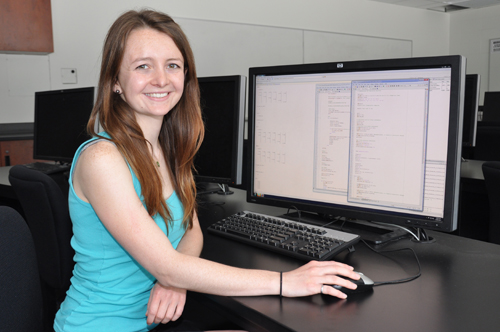
If you turned on your computer today and it didn’t explode, you can thank researchers like Cynthia Mason. The master’s student in engineering systems and computing is looking at ways to make computer chips last longer and more energy efficient – less explosive computers is an added bonus.
Working with Prof. Anthony Vannelli, dean of the College of Physics and Engineering Sciences, Mason is tackling the “global routing problem,” also known as wire chip layout optimization, which involves minimizing the length of wire used to connect transistors in a computer chip.
“We don’t want the wires to be overlapping too close to each other,” she explains. “Say you’ve got one trillion transistors. What’s the best way to place the transistors so that they have the shortest length of wire? On top of each other, the length is zero but that won’t work because the moment your computer turns on it heats up and explodes. We want to spread it out so that we don’t have as many wires in the same area and that will reduce hotspots.” The computer chip will also last longer, work faster and use less energy since the messages don’t have to travel as far.
To say that the shortest distance between two points is a straight line would be an oversimplification of Mason’s research. “The problem is those two points are on opposite sides of the square,” she says, and those points can only be connected horizontally or vertically like a grid. But what if those points are located diagonally from each other? “You can’t go diagonal on computer chips,” she says, because they contain horizontal and vertical layers made of silicon, which isn’t as conductive as metal. Keeping manufacturing costs down is another challenge because some of the best conductors are also very expensive.
Mason compares the inner workings of a computer chip to a telephone made of two cans connected by a piece of string. The longer the string, the more difficult it is for messages to get across. You also need to speak louder, which requires more energy. The same thing happens inside a computer chip: energy produces more heat when it travels a longer distance.
Mason studied environmental engineering as an undergrad at U of G. She met Vannelli in her first year and he later became one of her professors. During her fourth-year design project on wastewater treatment, which won the Water and Environmental Association of Ontario design competition in 2011, she found herself leaning towards systems design engineering.
“I want to learn more,” she says. “I want to completely spread my wings.” When deciding which direction she wanted to take with her master’s degree, she approached Vannelli, who suggested wire chip layout optimization. The project combined her interests in engineering, computing and math. “I always say to people, ‘When the door opens, jump through it.’”
Her background in environmental engineering also came into play when designing computer chips that are more durable and energy efficient. She hopes electronic devices of the future will last longer instead of ending up in landfills. “The problem is that people buy disposable technology right now and that really bothers me,” says Mason. “I’ll buy something that costs a little bit more just so that it lasts longer but we’re surrounded by people who don’t care.”
Her future plans include helping companies become more sustainable by optimizing their operations while maintaining or increasing their profits. “It’s right up my alley because it’s the optimization of how a company works.”